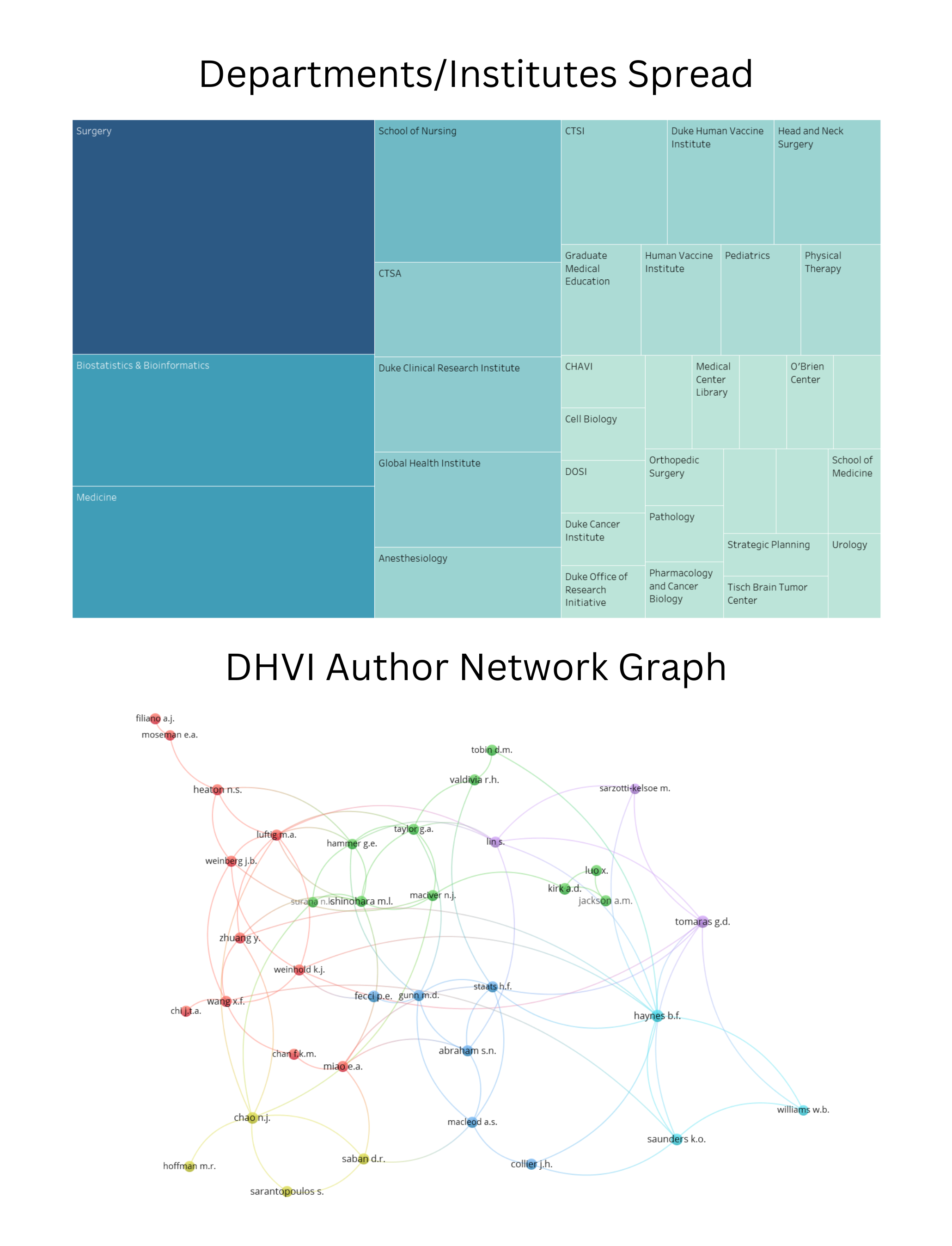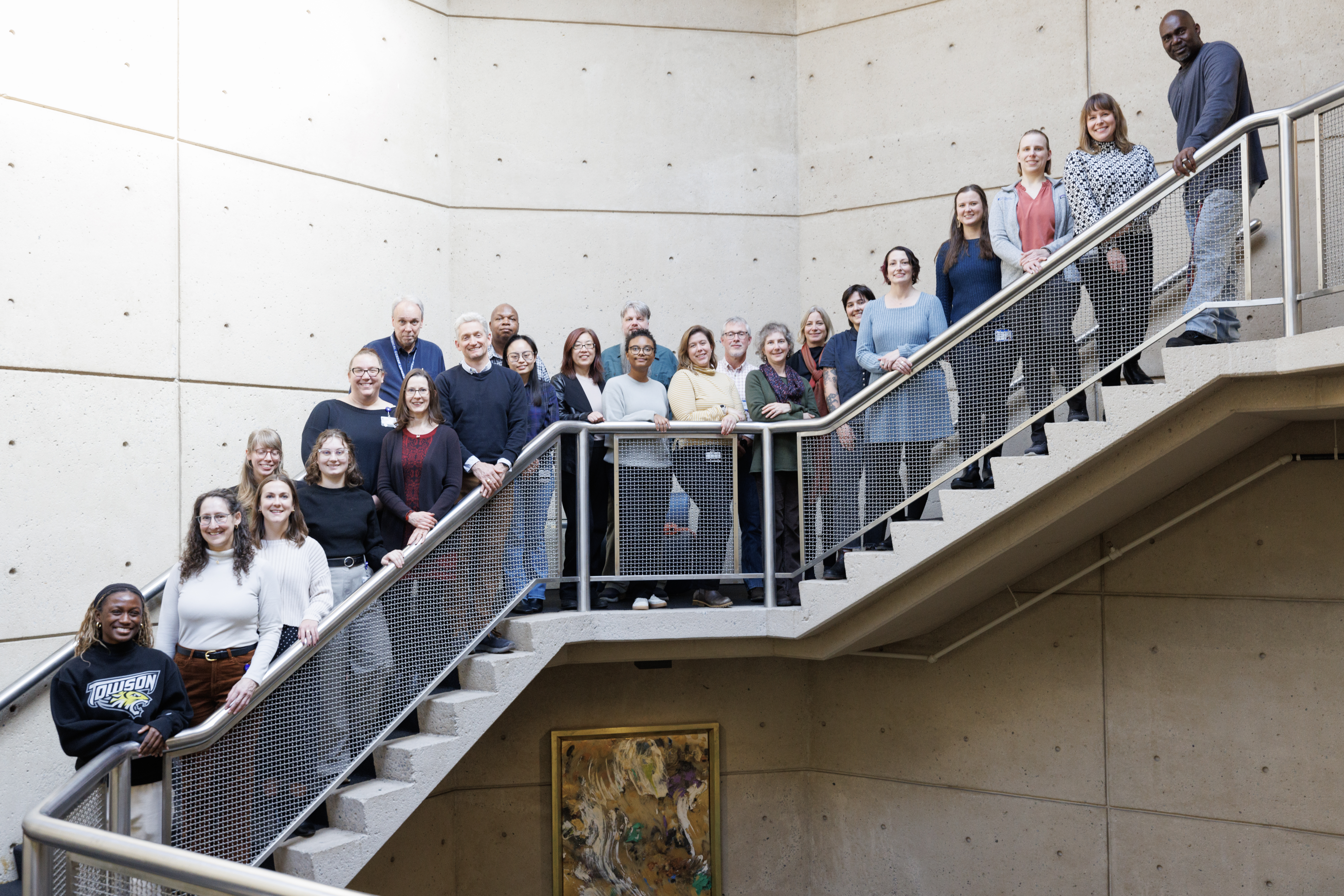
The Duke University Medical Center Library & Archives provides biomedical information, innovative services, educational programs, archival preservation, knowledgeable staff, and collaborative spaces.

We license, curate, and provide access to information resources for Duke Health, including:
Selected library resources have been integrated into MaestroCare and were viewed over 826,145 times in fiscal year 2023.
Centralized buying saves money: one of the lowest cost-per-use for a library-subscribed article is only $0.09. Independently buying an article directly from most publishers averages $40 per article.
In this photo, new titles from our Engel Collection. These books are available in the Reading Room.

We teach evidence-based practice, literature searching, and information synthesis.
We have liaisons to all of Duke’s academic health professions programs, Graduate Medical Education, and Duke University Health System nursing. We also teach on demand classes and create online tutorials to make learning available online, any time.
In the 2023-2024 academic year, librarians:
In this photo, medical students come to the library for the Finding the Best Evidence class.

We maintain administrative and historical records for Duke Health, including the records of 2 Nobel Laureates, World War II surgical teams, School of Medicine and School of Nursing departments, and student groups.
In fiscal year 2024, we:
In 2024, Duke celebrated the 100 year anniversary of Trinity College becoming Duke University. The Medical Center Archives was an important partner in these Centennial celebrations providing valuable information about the history of Duke Health. We had a 73% increase in the number of reference questions this past year, which we attribute to these celebrations!
Some newly processed and accessible collections this year are the papers of O. Michael Colvin; records from the Duke Administrative Professionals Affinity Group and the records from the North Carolina Licensed Practical Nurses Association.
We also collaborated on a Bass Connections oral history project documenting the work of activists and “change agents” throughout Duke’s history.
In this photo, illustration of the Davison building by former Duke medical illustrator Bob Blake. You can view his professional papers at the Archives.

To many people, the Library is first and foremost a place… even though most of our collection is available electronically. We get it: there is something special about going to the library to meet with others or to study, write, or work.
Room reservations are up 30% over the previous academic year, representing over 18,000 hours of classes, meetings, brainstorming sessions, group work, and study.
We continue to transform our spaces to meet student, staff, and faculty needs.
In this photo, are two photographs taken by Eamon Queeney, that capture how students use the library study rooms and whiteboards.

Librarians partner with faculty, staff and students to strengthen Duke research.
Systematic Reviews: A quarter (25%) of our 1,915 research consultations with Duke faculty, staff, and students are regarding systematic reviews or other evidence synthesis work. We have provided methodological expertise for more than 163 synthesis projects in the 2023-2024 academic year.
Research Impact: In the 2023-2024 academic year, our staff worked on 27 research impact projects to demonstrate the research impact of departments and research teams using publication data. Our staff collaborate across Duke to showcase the potential for using Scholars@Duke publication data.
Animals in Research - Searching for Alternatives: Librarians construct comprehensive literature searches for Institutional Animal Care and Use Committees (IACUC) protocols in order to seek methods of reduction, refinement, and replacement. We conducted 76 searches to support these protocols.
Championing Open Science and Open Access: Librarians guide researchers through funders’ open science initiatives, such as the NIH Public Access Policy and the new NIH Data Management and Sharing Plan Policy. Librarians facilitate open access to research through transformative subscriptions, such as one with PLOS, which allow Duke researchers to share their research more openly with the world.
In this photo, is a treemap of the departments and institutes assisted over the past 8 years of our bibliometrics service. The bottom graphic is an author network graph of the Duke Human Vaccine Institute researchers.

In August, library staff enthusiastically greeted learners, faculty, and staff from across the Duke Health System and health professions education programs to kick off the new semester with a lively Welcome Event. The library buzzed with excitement as attendees enjoyed free popsicles, explored our extensive resources, and participated in fun activities. Highlights included setting up mobile apps, creating ORCID profiles, and discovering the wide range of library services. We also debuted our brand-new button maker, allowing attendees to be creative and to interact with each other during the festivities. We hope this new annual tradition will make it easier for students, faculty, and staff to meet each other and to learn about what the library has to offer!
In this photo, faculty, staff, and students make buttons with the library’s new buttonmaker. On the right, individuals gather for free popsicles and information on research tools.

After a year of dedicated teamwork and preparation, the library launched Alma, a cloud-based Library Service Platform (LSP), alongside other Duke University libraries in a campus-wide initiative. Alma has transformed all of our resource management workflows by providing a unified platform for both electronic and print resources, replacing the multiple systems previously needed for each. The new system has significantly reduced redundancies and increased efficiency across our operations.
Alma’s user-friendly, intuitive interface and powerful search functionalities allow staff to find resources more quickly, helping connect patrons with needed materials more easily. The system’s built-in workflows further enhance efficiency, automating daily tasks such as hold-shelf management and electronic resource activation. One of Alma’s most transformative features is the Analytics module, which provides detailed reports and data visualizations that guide smart, data-driven decisions about collections and services, such as identifying usage trend and what library resources are most frequently accessed.
While patrons may notice some issues with the front-facing discovery system, staff are actively working to resolve these as part of ongoing improvements. As the team continues learning and adapting to this complex system, the Library can now make more responsive and informed choices, improving services to meet patrons’ needs.
In this photo, our Content & Discovery team gathers by the service desk. This has been the core team during the Alma launch and transition.

Our staff has expertise in information technology, administration, collection curation, archives, access services, and research and education.
Six members of our staff celebrated a career service milestone in 2024, representing a total of 125 years of service to Duke.
In 2024, we co-authored 93 peer-reviewed journal articles – most of which are the result of collaborations with Duke authors on systematic reviews and other research projects. Library staff members also delivered presentations at conferences, co-edited a book, and served the university community and our professional networks through committee work, peer review, and leadership roles.
In this photo, our library staff and interns gather in the third level stairwell for a staff photo.